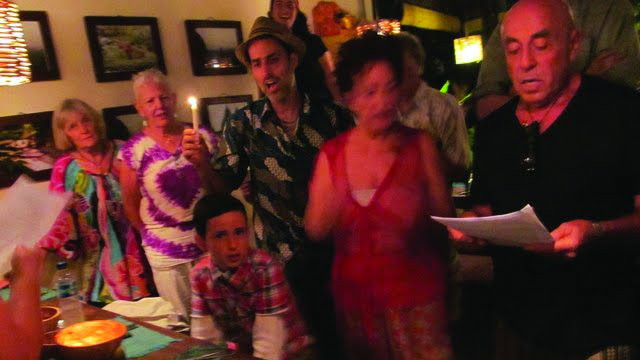 |
Last month I described the magic of Bali and what our family experienced living in Indonesia for three months.
Having expected to find only a few Jewish ex-pats and no organised community, we had prepared ourselves to be Jewishly self-sufficient for our stay. Food was not a problem — we had our own kitchen. The Balinese were not fazed by our ‘weird’ Jewish rituals and when they asked us what we ‘were’, in most cases seemed to have no clue about Judaism.
I had been advised to steer away from Israel discussions and kept things strictly theological. The Jews we met were not in Bali for Jewish reasons — they had come to surf, to study or teach yoga; for healing or meditation or any of the many offerings of the island, and Judaism was not a priority, or in many cases even a consideration. Channukah changed everything. The week before, I started to build a Channukiah with the kids from bamboo and coconuts, and we planned to host people (Jewish and not) at our house for the 8 nights. Just on the off-chance, I asked around if anyone was planning to hold a Channukah lighting, and was told that there was actually a Channukah party at a restaurant for second night. Wow! My kids nearly bounced off the porch with excitement — Jews, Channukah party… here in Bali??!! The evening approached and we took ourselves and our Channukiah to the restaurant to find an eclectic mix of about 40 Jews and some interested Indonesians and guests too. When I ‘outed’ myself as a rabbi, it was their turn to bounce off the porch and I was roped into leading the lighting, songs and explanations of the holiday. Later, someone asked me if I had been to [name of town] for Shabbat. Why? Well, that’s where [name of family] host people for Shabbes.
Let me digress to explain why I am not revealing the name of this family. The Indonesian government only recognises five official religions (Islam, Christianity, Hinduism, Buddhism and Confucianism). Indonesian law requires that every citizen hold an identity card that identifies that person with one of these five religions. While ex-pats can do pretty much whatever they like in the privacy of their home (including practise as Jews), they may not proselytise others to their religion or set up any kind of communal institution. This can result in expulsion or imprisonment. For the safety of this family, I will not print the details, but if you are planning to go to Bali and would like to be hosted for a Shabbat or Yom Tov, let me know and I will fill you in. So now, back to Channukah…
A shul and a Torah
My jaw dropped. There is a family who hosts Shabbes meals? Who are they, how do I get hold of them? It turns out that in this town, there are actually two Shabbat- hosters. One is a Friday night dinner only. Then there is also an observant Sephardi family who have a fully set up home with place for people to stay and kosher meals every Shabbat. The next day I booked ourselves in for the Shabbat of Channukah. But first we had to find the place. It had no indication to the outside world except a small English sign (no Hebrew) and unobtrusive mezuzah. But be ready to be astounded: this family had rented a villa near the beach, and with the help of Chabad has set up a Shabbat-hosting programme, complete with a kosher kitchen and kids’ programme. They had had over 100 guests over Sukkot and Pesach.
After the meal, they offered to show us around and we were asked if we wanted to see the shul. The shul? There is a shul here? Behind a locked door is a small, beautiful wooden shul, with a hand-carved ark and bimah, and, behind the curtain, a beautifully adorned, full-size Sephardi Torah. A Torah, here in Bali? How did it get here? Our hostess explained what lengths her husband had gone to in order to bring the Torah from Singapore.
They have to be very careful who they invite for Shabbat — ex-pats are not a problem, but if an Indonesian should be seen to be ‘induced to convert’, they would be kicked out the country.
We stayed until Havdalah, lit several Channukiot and felt privileged to have spent Shabbat in the only working synagogue in Indonesia. This family’s commitment was an inspiration to me, and although they sometimes felt frustrated that more Jews were not jumping at the opportunity to come and spend Shabbat there, they had pinned up on their noticeboard a saying that they hold by — “Anyone who thinks that you can’t affect the world because you are too small or too weak has never spent a night in a room with a mosquito!”











